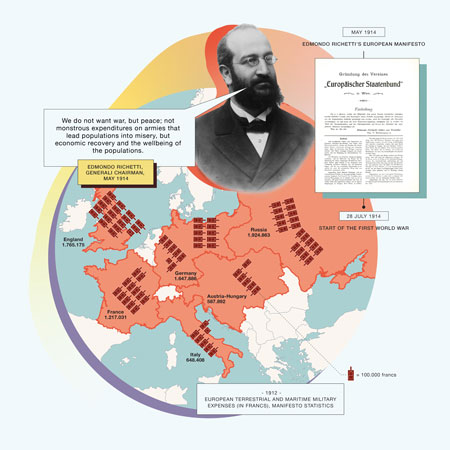Edmondo Richetti, Europe’s first pro-European
MEP Friedrich Ambiel – European Parliament plenary session – Brussels
Notes for a farewell speech
My fellow MEPs,
I take the floor for the last time today, in my third term as a Member of the European Parliament; due to reaching retirement age, I will not run for a seat again and so, starting next month, someone else will occupy this chair.
These have been years filled with love for this place and this continent.
I am from Austria, a country which, under Habsburg rule, showed – albeit in an undemocratic way – how a unity of peoples, languages, and nations could bring about prosperity, progress, and peace.
That is why I would like to quote the words of a man who, like me, was Austrian, even though he was born in Trieste; like me, was of Jewish descent; and like me, loved Europe – loved it long before we could imagine an idea of Europe – and the spark that ignited his idea of Europe was a spark of peace.
That man was Edmondo Richetti.
Shortly before the outbreak of the First World War, Edmondo Richetti invited citizens from all over Europe to join the Europäischer Staatenbund: “Organisieren wir uns in eine grosse Vereinigung” was his battle cry, “Let us join together in one great union”, that could count on members in every corner of Europe.
Today, we have become accustomed to the concept of peace that prevails in our nations, thanks also to the institution to which we are honoured to belong, but peace is a condition without which we cannot imagine any chance of life:
“All the peoples of Europe, regardless of origin, desire peace,” Richetti said. “All peoples, regardless of class, would rejoice to see the European states united and bound together to ward off the horrors of war.”
Edmondo Richetti was a visionary entrepreneur, a middle-class man awarded a noble title, the head of the Jewish community, a cosmopolitan citizen of the world, the head of Generali, one of the leading insurance companies on the continent; a businessman but also a humanist, so interested in the world around him that he formed a bond with Sigmund Freud. He was a founder of the “Europäischer Staatenbund” association (Union of European States), which he promoted in Vienna in 1914 because: “We do not want war, but peace; not monstrous expenditures on armies that lead populations into misery, but economic recovery and the wellbeing of the populations”.
Words that should be engraved in this parliamentary chamber, and perhaps in every school on this continent.
I will carry them with me so that the wellbeing of the peoples of Europe can become the wellbeing of the peoples of the world.
Long live peace. Long live Europe.
Thank you
HISTORY

Richetti was Secretary General until 1909, then Managing Director of Generali – when the title of this role was changed with the statutory reforms reinstating the office of Chairman – until 1913, shortly before his retirement and his death, in August 1914 in Reichenau, Austria. In his final months of service, he was promoted to Director.
An influential Jewish family from Trieste, the Richettis played significant roles not only as citizens but also in Generali, for at least three generations.
Richetti perfectly embodies the profile of the Generali executives of his day: with a business-focused higher education, he began his career in Vienna, home of the Group’s first subsidiary company, and only later moved to the Head Office in Trieste. Richetti also exemplifies the Zeitgeist of Trieste in the Habsburg era: Central European, cosmopolitan, and cultured with links to the peaks of modernity; representing the ties between Generali and the community to which it belongs; dedicated to the values of internationality, openness, and belief in progress, also guaranteed by the welfare function of insurance and, last but not least, to peace.
